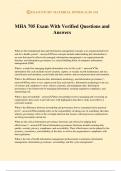©EXAM STUDY MATERIAL 8/9/2024 11:50 AM
MHA 705 Exam With Verified Questions and
Answers
What are the foundational data and information management concepts at an organizational level
and for a health system? - answer✔✔These concepts include understanding that information is
an asset that must be effectively managed, information management is an organizationwide
function, and information governance is a crucial building block of enterprise information
management (EIM).
What is a model for managing digital information over its life cycle? - answer✔✔The
information life cycle includes record creation, capture, or receipt; record maintenance and use;
classification and metadata; record audit and data controls; and record preservation and retention.
What is the difference between data, information technology, and information governance? -
answer✔✔Data refers to raw, unprocessed facts and statistics. Information technology is the use
of systems and computers to store, retrieve, transmit, and manipulate data. Information
governance is the framework for managing information, ensuring regulatory compliance, and
minimizing risk.
What is data stewardship? - answer✔✔Data stewardship involves managing and overseeing an
organization's data assets to provide users with highquality data that is easily accessible in a
consistent manner.
What is the difference between stewardship and governance from a conceptual and a practical
level? - answer✔✔Stewardship refers to the responsibility of taking care of something, like data,
whereas governance refers to the oversight function that ensures critical processes and practices
are being reasonably carried out.
What are the critical information governance functions and criteria for judging their
effectiveness? - answer✔✔Critical information governance functions include ensuring data
quality, security, privacy, compliance, and accessibility. Their effectiveness can be judged by the
accuracy, consistency, and reliability of the data, as well as the organization's compliance with
data regulations.
What is the role of health information management professionals in enterprise information
management, information governance, stewardship, and life cycle management? -
, ©EXAM STUDY MATERIAL 8/9/2024 11:50 AM
answer✔✔Health information management professionals are responsible for ensuring the
availability, accuracy, and protection of the clinical data that healthcare providers rely on to
deliver patient care. They play a key role in collecting, analyzing, and protecting data, and they
ensure that information flows seamlessly and securely in the healthcare system.
What is the difference between information theory and information science? -
answer✔✔Information theory is a branch of applied mathematics and electrical engineering that
involves the quantification of information. Information science is a multidisciplinary field
primarily concerned with the analysis, collection, classification, manipulation, storage, retrieval,
and dissemination of information. Health Information Management fits into information science
as it deals with data and information about health and healthcare.
What is the foundational value of information according to Gleick? - answer✔✔Gleick states
that information is what our world runs on: the blood and the fuel, the vital principle.
Information is fundamental to life and is the basis for all sciences.
What is the role of information theory today? - answer✔✔Information theory today is a branch
of applied mathematics and electrical engineering and involves the quantification of information.
It impacts fields from mathematics to management, astronomy to physics, and biology to
medicine.
What is the role of information science? - answer✔✔Information science is a multidisciplinary
field primarily concerned with the analysis, collection, classification, manipulation, storage,
retrieval, and dissemination of information. It's where health information management lives as an
applied information science with data and information about health and healthcare at its core.
What is the first principle of contemporary information management? - answer✔✔The first
principle is that information is an asset of the organization that has strategic value and must be
deliberately managed.
What is the second principle of contemporary information management? - answer✔✔The second
principle is that information management is an organizationwide function. It calls for explicit
structures, policies, processes, technology, and controls that together describe the discipline of
enterprise information management (EIM).
What is the third principle of contemporary information management? - answer✔✔The third
principle is that information governance is a crucial building block of EIM. It is an oversight
function that ensures that critical processes and practices are being reasonably carried out.
What are the five stages of the information life cycle? - answer✔✔The five stages are record
creation, capture, or receipt; record maintenance and use; classification and metadata; record
audit and data controls; and record preservation and retention.




